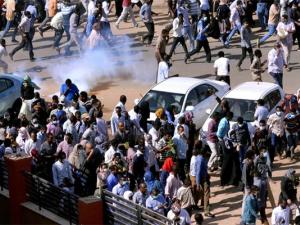
South Sudan activists decry Juba ban on media coverage of Sudan unrest
Human rights activists in South Sudan have protested against a government order banning media in the country from covering the unrest in Sudan.
Reec Malual, a Juba-based lawyer and human rights activist on Wednesday said that the order passed by the South Sudan Media Authority on Monday is inappropriate and violated press freedom.
“It is not appropriate to suppress voices as it contradicts articles 24 and 32 of the Transitional Constitution of the Republic of South Sudan (TCSS) 2011 as amended which provide rights to freedom of expression and access to information,” said Mr Malual.
South Sudan media regulator argued that the demonstrations in the northern neighbour, now in their third week, were internal affairs.
“The ongoing protests in Khartoum are internal issues affecting a friendly nation, the media in South Sudan should not write or broadcast instigative statements and comments about it,” Sapana Abuyi, the acting director of the media regulator said in a statement.
The order followed a complaint by the Sudan embassy in Juba after Al Watan, an Arabic newspaper in Juba, run articles deemed to be supportive of the protests.
The paper's Editor-in-Chief Mr Michael Christopher was summoned to explain the motive for publishing stories critical of President Omar al-Bashir's government.
The media regulator also ordered the newspaper to publish an official apology to the Sudanese embassy within 72 hours.
However, Mr Christopher has vowed not to apologise saying that the publication did not flout media guidelines.
“My position is that I cannot make any apology...our newspaper didn’t violate the rules of the media authority and the overall journalistic work in the country,” he said.
Edmund Yakani, another activist, said the directive aimed at stifling free speech.
"This is a violation of freedom of expression. South Sudanese media covering the political developments in Sudan is not a crime and since we have Sudanese population in South Sudan it is their legal right to know what is taking place in Khartoum,” said Mr Yakani.
Deadly anti-government riots have rocked major Sudanese cities including the capital Khartoum since December 19.
The government says 19 people, including two soldiers, have so far been killed, but Amnesty International says it has credible reports that 37 people were shot dead by security forces in the first five days.
The protests began following a government decision to increase the price of bread, but have turned political with demonstrators now demanding the exit of President Bashir.
Sudanese authorities have crackdown on opposition leaders, activists and journalists to prevent the spread of protests.
Juba fears soaring relations between President Salva Kiir and President Bashir. South Sudan seceded from Sudan in 2011.
Joseph Oduah
